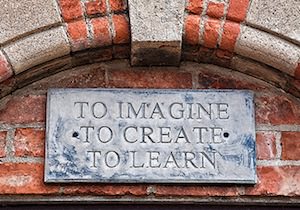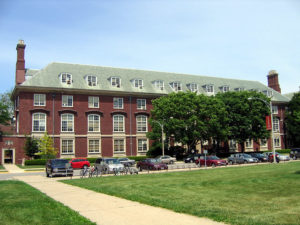Where Education Is ‘Sold to the Highest Bidder’
The attack on the spirit of higher education is exemplified in the installation of former Indiana Gov. Mitch Daniels, a neoliberal archfiend of public schooling, as president of Purdue University.
The attack on the spirit of higher education is exemplified in the installation of former Indiana Gov. Mitch Daniels, a neoliberal archfiend of public schooling, as president of Purdue University.
Daniels is the Republican sweetheart who made waves two weeks ago when The Associated Press reported that in 2010 he directed his staff to make sure no Indiana schools were teaching the work of American historian and critic Howard Zinn. Daniels called Zinn “anti-American” and his “People’s History of the United States” — a book beloved by the left for its unflinching look at two centuries of political brutality — “a truly execrable, anti-factual piece of disinformation that misstates American history.”
Writing in Jacobin magazine, two brave Purdue University professors, Tithi Bhattacharya and Bill V. Mullen, describe their president as “part of a national project to dismantle the already-shrinking public sector and subject the lives of working people to the vagaries of the market. His first legislative initiative after taking office as governor was to strip public sector employees — including teachers — of collective bargaining rights. As governor, Daniels cut 150 million from higher education, created the largest voucher scheme for public education in the country, and ended his term by forcing through right-to-work legislation in Indiana. In all of these endeavors, Daniels was a trailblazer for more notorious Republicans like Wisconsin’s Scott Walker and proponents of SB5 legislation in Ohio.”
Daniels, Bhattacharya and Mullen tell us, is part of a nationwide drive to privatize national education that began in the 1980s. This trend “has been marked by several features: a shift from state tax dollars to tuition and fees to pay for college, increasing support for universities from corporations, and the privatization of university services,” they write.
Daniels’ policy decisions at Purdue are correctly viewed as an extension of his work as governor. After watching him make titanic cuts to the state budget, the Purdue board of trustees advertised Daniels as a “cost cutter.” During his eight years of state leadership, “student tuition at Purdue increased nearly 100 percent due to state funding cuts, and student debt reached a record high of $26,000 per student.” The cost cutter is open about his priorities. This June, Daniels told members of the Association of Private Sector Colleges and Universities: “We need you. … I’m only interested in result per dollar charged,” Inside Higher Education reported. “That’s the value equation.”
Bhattacharya and Mullen say “this worldview has become universalized. Forbes magazine wrote with approval last year of the ‘stealth privatization of one important American public sector institution: the state university.’ According to Forbes, ‘More and more so-called state universities receive 15 percent or less of their basic operating funds from the state. Thus tuition increases have soared at these schools, even more so than at private universities.’ “
“Both Democrats and Republicans project private charter schools as better ‘choices’ for students,” the professors continue. The charter program connects K-12 to higher education systems, and the result is the conversion of schools into fields for the cultivation of a society-wide business mindset. “Recently, the Hunter School of Education partnered with three urban charter school organizations in New York to collaboratively design a teacher preparation program that will lead to teacher certification and a master’s degree in education. Business accounting methods — test scores, the installation of business executives to run schools and school systems — emphasize ‘test prep’ and the funneling of students into jobs as managers and professionals, at the expense of critical thinking and a meaningful curriculum.”
According to the National Student Clearinghouse Research Center, the privatization of education has resulted in a 2.3 percent drop in college enrollment nationwide this year. Black Americans are disproportionately affected. Changes to loan programs deprived more than 15,000 families of higher education loans last fall, and at “South Carolina State University, where a majority of students come from families earning less than $30,000 per year, enrollment has dropped by more than 700 students since last year.”
“Program after program and campus after campus, universities are being remade … ‘to operate according to the principles that guide multinational corporations,’ ” Bhattacharya and Mullen write. “This means that we no longer ‘teach students,’ but ‘provide a service to consumers.’ Programs that don’t index easily to the market, such as literature, history, or ethnic studies, gradually become ‘less important’ compared to business studies.”
These changes, which amount to the removal of education from democratic control, mean that historians and intellectuals like Howard Zinn — people who are critical of university privatization — are deemed hostile to neoliberals who masquerade as defenders of education.
“[W]hile our university president has called the late historian ‘un-American,’ ” Bhattacharya and Mullen conclude, “we — along with Zinn and Langston Hughes before him — continue to work towards ‘The land that never has been yet — And yet must be,’ where education is not sold to the highest bidder, where neighborhood schools are not closed by neoliberal mayors, where Trayvon Martin can walk home safely. Where ideas are discussed in classrooms and public parks — not banned from schoolbooks.”
— Posted by Alexander Reed Kelly.
Your support matters…Independent journalism is under threat and overshadowed by heavily funded mainstream media.
You can help level the playing field. Become a member.
Your tax-deductible contribution keeps us digging beneath the headlines to give you thought-provoking, investigative reporting and analysis that unearths what's really happening- without compromise.
Give today to support our courageous, independent journalists.




You need to be a supporter to comment.
There are currently no responses to this article.
Be the first to respond.